Brexit represents a significant event that withdrew the United Kingdom (UK) from the European Union (EU) to establish independent trade relationships. This decision had a massive impact on the global economy, politics, and social landscapes. This is what led to this decision and the impact it had on the world, four years later.
Why the UK left the European Union
The vote for leaving the EU had been building up for many years. Britain joined the European Economic Community in 1973 which transitioned into the EU in the 1990s. The goal was the unite European nations to improve free trade, protect against crime and terrorism, and to provide more control over immigration and public services. The 2008 recession affected European countries particularly hard. This fueled debates between British political parties and put pressure on Prime Minister David Cameron to hold a historic vote to decide if the UK should leave the EU.
In 2016, the votes passed with 52% support. The UK officially exited the EU on January 31, 2020, but continued to participate in EU institutions during the transition.
New Trade Deals
After departing from the EU, the UK began to develop independent trade deals with other nations. Today, more than 70 countries have formed trade agreements with the UK including the EU. Many of these new deals replicate the terms that the UK had in the EU. However, some countries like Japan, Australia, and New Zealand have taken the chance to negotiate new terms. Other major trade partners, like the United States and India are still in negotiations with the UK.
Economic Impact
Recently, Brexit has lost popularity in the UK. In 2024, only 34% UK residents thought it was the right decision to leave the EU. The remaining population either regrets Brexit or is unsure if it was the right decision.
The economic impact has been profound, with trade disruptions, fluctuating GDP growth rates, and shifts in investment patterns dominating headlines. The uncertainty surrounding trade agreements and regulatory frameworks has led to hesitancy among investors and businesses, impacting sectors ranging from finance to manufacturing. While some argue that Brexit offers opportunities for regulatory autonomy and trade diversification, others express concerns about increased costs and barriers to market access.
Despite the challenges, many officials in the Parliament perceive Brexit favorably. In a statement from Minister of State Kemi Badenoch she stated, “Since the UK’s departure from the EU, this Government has cut burdensome red tape for business. We’ve built dozens of trading relationships with new friends and old allies. And we’ve taken back control of our laws, borders, and tariffs.” Perhaps with more control over trade agreements and tariffs, the UK will see more economic growth in the coming years.

